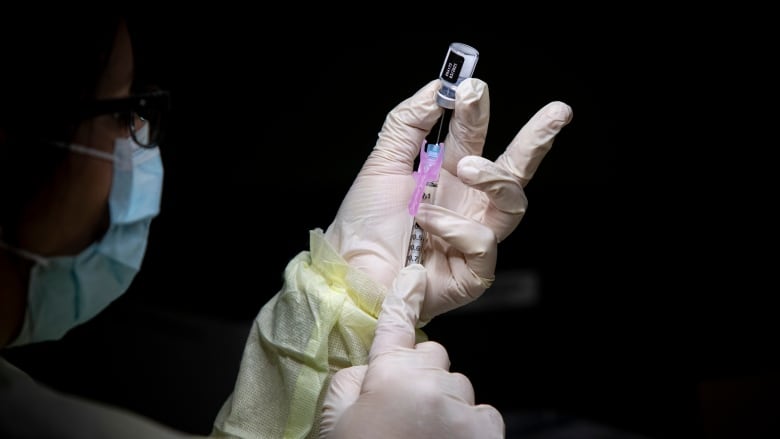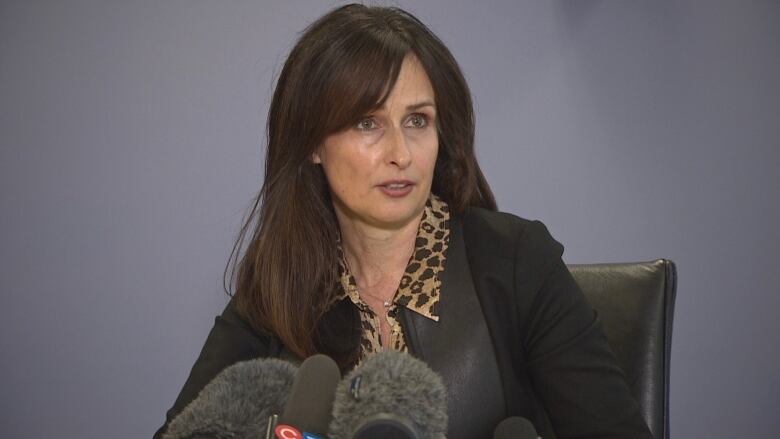A behind-the-scenes look at why Canada delayed 2nd doses of COVID-19 vaccines
Experts say efficacy of 1st COVID-19 vaccine dose is a 'game changer,' but critics call delay an 'experiment'

This is an excerpt from Second Opinion, a weekly roundup of health and medical science news emailed tosubscribers every Saturday morning. If you haven't subscribed yet, you can do that by clickinghere.
Danuta Skowronski was poring over Pfizer-BioNTech vaccine data on a Friday night in mid-December when she had an "aha!" moment.
The epidemiology lead at the British Columbia Centre for Disease Control realized she could actually "correct" the data Pfizer had submitted to the U.S. Food and Drug Administration on the effectiveness of just one dose of its vaccine.
In clinical trials, Pfizer couldn't accurately determine the efficacy of a single shot because participants had already received their second dose after three weeks, and there was no comparative one-dose study done.
Pfizer reported an efficacy of 52 per cent for one shot, compared to the more commonly cited 95 per cent after the second.
But Skowronski, who has been working on vaccine effectiveness analyses for more than 15 years, realized the company had included in its analysis the two-week time period immediately after vaccination before the body's immune response typically kicks in.

She told CBC News vaccines are never expected to protect "instantaneously," and that there is always a "grace period" of a couple of weeks that factors into vaccine effectiveness.
"What we found was that they were underestimating the efficacy of the first dose, and rather than the efficacy being 52 per cent, it was actually 92 per cent," she said. "For us, that was a game changer."
The finding ledtheNational Advisory Committee on Immunization(NACI)to change therecommendedtime between doses of COVID-19 vaccines from three weeks to an unprecedented four months.
B.C. announced it would be delaying second doses earlier this week. Ontario, Quebec, Alberta, Manitoba and Newfoundland and Labrador quickly followed suit.
Canada is now an outlier in the global vaccination rollout. No other country in the world has delayed second doses up to four months, and there is no evidenceyet on the long-termeffect it could have on immunity to COVID-19.
Some scientistssaywe are venturing into unchartedwaters. Others are comfortable with the risk.
Why isCanada delayingsecond doses?
NACI says if second doses are stretched to four months across the country starting this month, close to 80 per cent of Canadians over 16 could get at least one shot of the Pfizer-BioNTech or Moderna vaccine by the end of June.
But Canada's chief science adviser, Mona Nemer, says the decision to delay doses amounted to a "population level experiment."
"The comment from the chief science adviser was most unfortunate," said Skowronski. "It did not reflect the careful risk-benefit analysis that went into this decision, and frankly,that is a science and an art to be able to do that."
But aside from a vague reference to "real-world effectiveness" from Canada and other countries in NACI's recommendations, little evidence has been communicated to Canadians to convince them that the change in vaccine rollout strategy is the right move.
NACI says its decision to delay second doses is based on emerging real-world data from Quebec, B.C., Israel, the U.K. and the U.S. that showed "good effectiveness" of between 70 and 80 per cent from a single dose of the vaccines "for up to two months in some studies."
But it also makes clear that these studies haven't yet collected four months of data on the long-term effectiveness of a single dose, meaning NACI is betting on the "high levels of protection" shown so far.
"It's shown us really good vaccine effectiveness two months after receipt of the first doseand that the effectiveness isn't decreasing over time," Dr. Shelley Deeks, vice-chair of NACI and a lead author of the recommendations, said in an interview.
"After looking at it from all of these angles, and given that we are in a situation of limited supply, the committee came to a strong consensus that we recommend the interval to be extended to four months."
Deeks said NACIwill continue monitoring vaccine effectiveness data as it comes out around the world to determine if it needs to further alter its recommendationsmeaning another change to Canada's vaccine rollout strategy is possible.
"If we need to reassess and revise the recommendations, we will," she said. "But this will allow more Canadians to receive the first dose and have a vaccine in a more timely manner and will have an impact on serious disease."
'Not based on evidence'
The move has effectively doubled Canada's doses of COVID-19 vaccines overnight, but some scientists arecritical of the move to experiment with delaying intervals.
"The decision is not based on evidence. It's really based on an extrapolation of the evidence," said Brad Wouters, executive vice-president of science and research at the University Health Network in Toronto.
"We've only been giving this vaccine for two months, so we don't have data out to four months no one in the world has been waiting four months for a second dose."
WATCH |The science behind delaying the 2nd dose of COVID-19 vaccines:
Wouters says it's unclear if the delay will impact the effectiveness of the second dose, and the decision comes with a lot of uncertainty in the months ahead.
Skowronski says once good protection is established, it doesn't suddenly disappear or "fall off a cliff." Instead, protection against a disease wanes gradually after a vaccination, which buys researchers time to "re-evaluate the optimal timing of the second dose."
She said that longer intervals between a first and a second dose of a vaccine are generally preferredbecause shorter intervals can interfere with the immune boost response and longer intervals are often associated with ultimately higher antibody levels.
Alyson Kelvin, an assistant professor at Dalhousie University in Halifax and virologist at the Canadian Center for Vaccinology, says the clinical trials on COVID-19 vaccines ran with the shortest time frame possible so they could get data out quickly, but previous studies on other vaccines show longer intervals are generally better.
Skowronski says it's unclear whyPfizer wentwith a three-week interval fortheir clinicaltrials, but itmay bebecausethey didn't expect to have such good protection with the first dose.
"The only reason to go with a shorter interval is if you don't get good protection with the first dose, and a second dose administered sooner could top it up a lot," Skowronski said.
"That's a scenario that we are not dealing with here. We're getting excellent protection after the first dose, and we have a clear and present danger threat now with ongoing elevated pandemic disease risk on top of that scarcity of vaccine supply."
Lack of clear communication for Canadians
While Skowronski is confident delaying the second dose is the right move for Canada, she and other experts feel the communication to Canadians from NACI on the decision could have been more clear.
Kelvin said it's important to stress to Canadians that they still need a second dose eventually tohave as much protection from COVID-19 as possibleand that they should take any vaccine offered to them to combat its spread.
WATCH |The evidence is there for the 'concept of further delay' of second doses: Dr. Naylor:
Dr. David Naylor, who co-chairs the federal government's COVID-19 immunity task force, said the decision to delay doses is "defensible," but agreed the decisioncould have been explained much more clearly to Canadians.
"There didn't seem to be an organized communications strategy overall," he said.
"The unhappy result is that a decision which might have been welcomed as a wider tide lifting many more boats and helping us end the epidemic more quickly has instead caused a real undercurrent of anxiety. I hope that subsequent communications will clear the air."
Wouters says he worries about how Canadians will interpret the move to delay dosesgiven the limited understanding the average person might have on the issue.
"There wasn't a lot of information about why the decision was made, what the evidence was, what the process was," he said. "There could certainly be a lot more transparency around the process and how that was done."

Dr. Allison McGeer, a medical microbiologist and infectious disease specialist at Toronto's Mount Sinai Hospital, says there is "overwhelming" evidence in favour of delaying second doses.
"People who haven't spent time in vaccination and thinking about vaccinationare always really anxious about the stuff you don't know in the future with vaccines," she said.
"I'm comfortable with those uncertainties, and with the fact that we can deal with them when we get there. But if you're not comfortable with that, there is a tendency to really worry about the potential consequences of doing that."
Skowronski says Canadians should expect health experts to adapt to and absorb emerging evidence as it becomes available and incorporate that into recommendations.
"You don't do business as usual in the midst of a crisis," she said. "You don't want experts that are holding steadfast to an earlier opinion or viewpoint while knowledge has amassed and moved on.
"You want your experts keeping pace with those developments and making decisions based on what is known as time evolves, especially during a dynamic crisis like an unfolding pandemic."
To read the entireSecond Opinionnewsletter every Saturday morning, subscribe byclicking here.















_(720p).jpg)


 OFFICIAL HD MUSIC VIDEO.jpg)
.jpg)



























































































